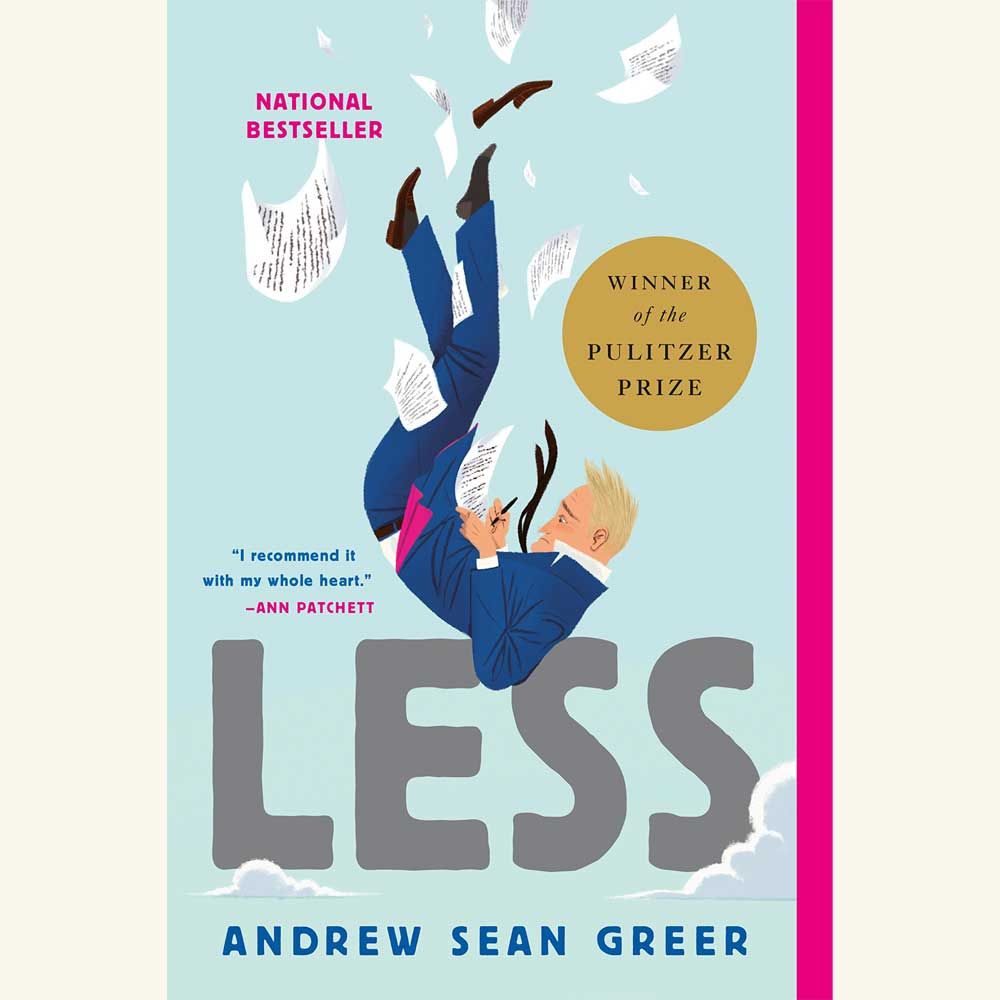The setup of Andrew Sean Greer’s Pulitzer-winning novel Less, our California Book Club’s February selection, makes you believe that you know how the story will end. The titular character, Arthur Less, a middle-aged, semi-failing novelist, receives a wedding invitation from his much younger former lover and, to avoid attending, accepts a series of assignments and random opportunities that whisk him across the globe. Certainly, you imagine from the details of Arthur’s memories at the start of the book, poor Arthur will meet someone somewhere (most likely a mature, debonair man with graying whiskers), and if the book is adapted into film, the tale will end on a freeze-frame: the two throwing cake in each other’s faces, Erasure’s “A Little Respect” ushering in the credits.
You brace yourself for a literary rom-com.
Or rather, like Arthur’s ex-partner Freddy reducing Arthur’s latest novel to a “gay Ulysses,” you are led to believe that you’re reading a queer spin on Eat, Pray, Love. Yet, as Arthur flies from Mexico City to Italy and then from Germany to his other destinations, his constant flashbacks, which appear abruptly from one paragraph to the next, introduce a poignant quality to the novel. You realize that Arthur hardly occupies the present exclusively. He may be touring Aztec ruins, but his soul is on the beach in 1980s San Francisco, in the moment he met his first love, Robert Brownburn, a widely acclaimed (and then-married-to-a-woman) poet. These wistful transportations, especially those that reach back into childhood, such as when Arthur relives viewing a collection of rare Japanese valuables with his mother, distance the novel from the rom-com genre. The depth of Arthur’s character is simply too profound. It’s not often you experience a protagonist whose thoughts are such a blend of wit and sadness, even when they’re thrust into awkward situations.
This mingling makes Arthur delightfully unique, but the real triumph of the novel is how Greer uses his main character’s perceptions to defamiliarize everyday occurrences, conversations, and even tropes found in classics like The Odyssey and The Aeneid. Of course, as in a rom-com, Arthur does have flings and gets stuck in hilarious predicaments, like being locked outside his own apartment mere hours before having to lecture at a foreign university, but somehow they feel fresh and unexpected. It’s as if you’ve never read about someone running away from heartbreak or trying to get back home. Greer accomplishes this by courageously insisting on the value of the idiosyncratic. While “dangling from the fourth floor of his apartment building,” Arthur contemplates dying, and we learn that he is far more concerned that his publisher will potentially misstate that Arthur was 50 years old instead of 49 years old when he fell to his death.
As readers, we get the skinny on Arthur’s love life, including his sexual exploits, but also his anxieties as a midcareer writer suffused with literary disappointments—and an excavation of the tensions of how his sexual orientation might affect the reception of his books. While drunk at a posh Parisian party, the influential writer Finley Dwyer even makes a point of telling him why he is not accepted into the queer canon: “It’s that you’re a bad gay.” Finley’s remark follows a series of pointed questions about whether Arthur understands his place in the gay community, and perhaps his explanation for why Arthur doesn’t win awards in certain literary circles is correct. But his words also suggest why Arthur endears himself to us. He knows he does not fit into anyone’s preconceived mold, but he doesn’t respond to critique by assimilating to norms. He isn’t replicable, predictable, or manageable, by Finley or anyone else—he remains true to his own sense of self.
Arthur’s charm comes from the amalgamation of his experiences, his quirky preferences, and his modes of thinking. At one point, you learn that a key figure in the novel fell for Arthur because of the way he says hello when entering a crowded room and how Arthur has maintained his innocence while navigating a life that would’ve left most others jaded. His authenticity allows you to read his sweeping international romantic quest as an entirely original tale. Arthur may be stranded abroad, but he is not a gay Ulysses.
With Less, you can see an adventure for what it really is: a chance to know oneself, which the book suggests is the same as being able to see the world anew. This demonstration of defamiliarization, really, is a gift from Greer.
It’s a story that’s hard to predict but also easy to want for yourself.•
Join us on Zoom on Thursday, February 16, at 5 p.m. Pacific time, when Greer will join CBC host John Freeman and a special guest to discuss Less. Please drop by the Alta Clubhouse to let us and your fellow book club members know your thoughts about the book. Register for the event.
EXCERPT
Read the opening pages of Less. —Alta
EVENT RECAP
If you missed last week’s CBC conversation with author and cartoonist Jaime Hernandez, host Oscar Villalon, and special guest Anita Felicelli, you can still read the recap or watch the video. —Alta
YEAR-IN-THE-LIFE NOVEL
Alta Journal contributor and National Book Critics Circle board member Heather Scott Partington reviews Kathryn Ma’s The Chinese Groove. —Alta
TOP SELLERS
Here are the bestsellers at independent bookstores across California as of January 18. —Alta
EMBRACING PLEASURE
Meghan O’Rourke writes a vivid tribute to the Pulitzer Prize–winning poet Charles Simic, who was at one time a professor of English at Cal State Hayward and who died on January 9. —Yale Review
HEIGHTEN THE ROMANCE
Listen to the first episode of a new podcast about storytelling with Alta editor at large Mary Melton and writer Amy Wallace. The guest is acclaimed director Baz Luhrmann. —Riveted
EPIC FAMILY HISTORY
In May, Stanford physician and professor Abraham Verghese will be back with a new novel, The Covenant of Water. —Publishers Weekly
NEW TV SHOW
Cast decisions have been made for the adaptation of Charles Yu’s novel Interior Chinatown. —Deadline
Alta’s California Book Club email newsletter is published weekly. Sign up for free and you also will receive four custom-designed bookplates.

















